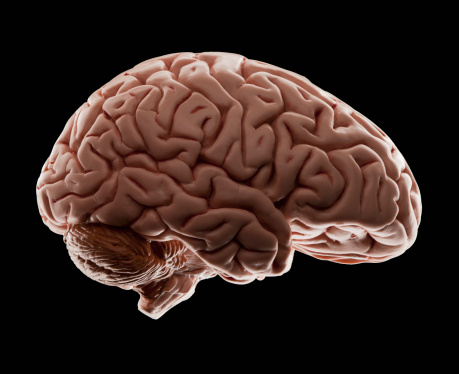
Of the five organs I can name, my brain is my third favorite, ahead of kidneys and spleen and just behind liver. But I know almost nothing about my brain other than that it is located in my head and hurts when my parents talk. So I learned a lot from neuroscientist David Eagleman’s fascinating new six-part PBS special, The Brain. My brain, I discovered while watching, is only mildly interested in important discoveries and really just wants to hear about itself.
When I saw, in Episode 5, that Eagleman was finishing a study using brain scans to determine how empathetic we are to people different from us, I asked if he would put me in an MRI machine and measure my biases. He got me an appointment with his collaborator Don Vaughn, a neuroscience Ph.D. student at UCLA. Vaughn entered the lab on skateboard, with ripped jeans, flip flops and a fauxhawk, apologizing for being tired since he just flew in from Houston, where he was deejaying. Within an hour, Vaughn both shot a selfie with me and asked if he could post a photo of my brain on social media. I’m guessing an MRI of his brain would just show the word millennial.
Vaughn measured blood flow in my brain while I looked at videos of hands being touched by a cotton swab or stabbed by a syringe. This allowed him to look at the regions of the brain that respond when viewing another person in pain–the so-called empathy network. Each hand was labeled “Christian,” “Jewish,” “Hindu,” “Muslim,” “Scientologist” or “Atheist.” I felt like I was empathetic to each hand, though about halfway through I briefly fell asleep while looking at a Christian hand. I do not know how to tell my Christian friends about this other than to be honest and say I will try to compensate by giving special attention to their hands’ feelings.
After I finished, Vaughn told me that Alexandra Karacozoff, his attractive neuroscience research assistant, saw my scan and said, “Wow, I never see a good-looking brain.” Apparently, if I were on Tinder, my brain scan would be my first photo. I have near perfect lobal symmetry and very distinct folds. Then Vaughn quietly pointed out to me that I have a freakishly small cerebellum. The cerebellum, I was not surprised to learn, controls motor skills, or what nonscientists call “ability to play sports.” It’s the kind of thing that isn’t a turnoff to a neuroscience research assistant but is to every other woman.
A few days later, Eagleman called me with my results. First, he told me that though some of the 135 other people he tested for his study were equally empathetic to all hands, many others care deeply about their in-group hands and a lot less about other hands. Then he explained that the test involves identifying a small signal within a lot of noise, so no individual result is accurate. Which, I well knew, is what you say before telling a guy that his empathy for others is so minimal he’s an outlier. Which, he said, I am–feeling for the Jewish hands and barely at all for the gentile ones. When I wondered if I had gone into the wrong profession, since I have to write about other people’s feelings and situations, he reassured me. “No. Psychopaths don’t care about other people, but they’re perfectly good at watching and observing and learning other people’s motivations. I’m just throwing it out there,” he said. I started to wonder if Eagleman’s empathy scores were any better than mine.
I was trying to figure out how to overcompensate for my apparent disregard of non-Jews, since marrying a gentile evidently hadn’t done it. But just as I was making a list of ways to stop myself from enacting genocide (“Step 1: Avoid any involvement in parade planning”), Eagleman emailed to inform me that after checking the settings on the scanner, he had reanalyzed the data, and my in-group prejudice is totally average. He ended this information with a smiley emoticon which, to me, looked Jewish.
Eagleman refused to rank the religions in the order of my hatred, though we both knew Christians would be at the top. Regardless, he believes that my brain does not condemn me to perpetrating a hand-stabbing genocide. “Let’s imagine there was some public outcry after this paper is published, saying ‘We want all our presidential candidates to go through this process,'” he said, imagining an experiment where we persuade all the candidates to get tested so Donald Trump doesn’t realize we’re measuring only him. “They could be overriding these basic impulses.” He hopes, in fact, that by becoming aware of how much some of us enjoy seeing Christians stabbed in the hand–which, if you think about it, is kind of an homage to their Savior–we can conduct a process of rehumanization to counteract the propaganda our in-group leaders give us to stay loyal to our tribe. If anyone is going to be able to deliver that world-altering message, it’s going to be someone with a super-sexy brain.
More Must-Reads from TIME
- Cybersecurity Experts Are Sounding the Alarm on DOGE
- Meet the 2025 Women of the Year
- The Harsh Truth About Disability Inclusion
- Why Do More Young Adults Have Cancer?
- Colman Domingo Leads With Radical Love
- How to Get Better at Doing Things Alone
- Michelle Zauner Stares Down the Darkness
Contact us at letters@time.com